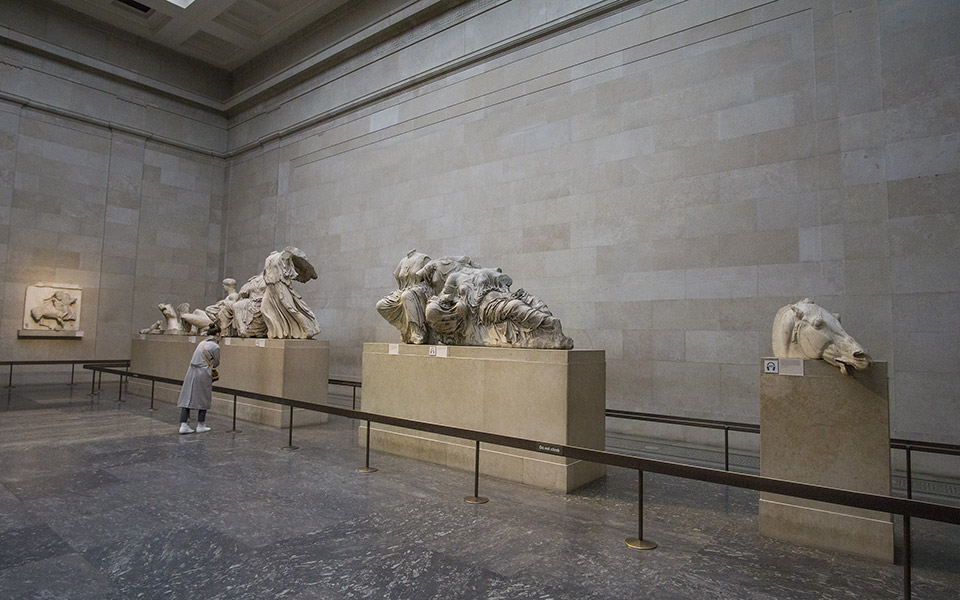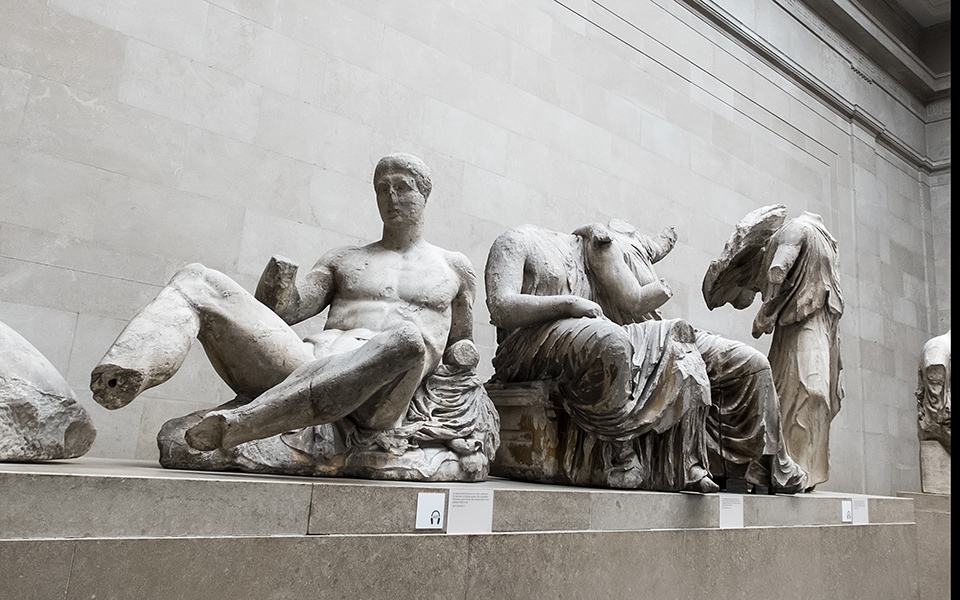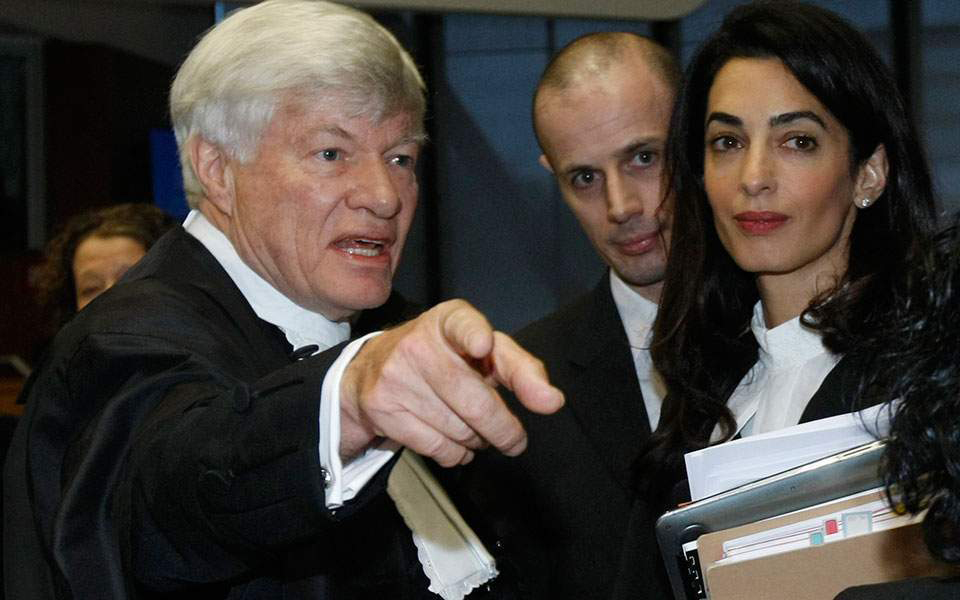By Marianna Kakaounaki
Geoffrey Robertson’s new book “Who Owns History? Elgin’s Loot and the Case for Returning Plundered Treasure” has just come out following years of research. Robertson gained recognition in Greece during a trip to Athens in 2014 with fellow barrister Amal Clooney and the late Professor Norman Palmer to deliver their legal opinion on the position of the Parthenon Marbles in international and British law to the government. Kathimerini spoke to Robertson to learn more about the book, which begins with stories from that “emotionally charged trip.” After analyzing the findings of his research, he concludes that the Marbles can and should be returned to Greece.
Robertson’s involvement in the matter began in 2011, when Greece’s then deputy minister for foreign affairs Dimitris Dollis came to his London office to ask him a question that had previously never crossed his mind, but which immediately caught his attention: “Might international human rights law help to retrieve the Parthenon Marbles?” At once, he rang Norman Palmer – whom he had previously collaborated with on a case of artifact repatriation from London to Australia – and Amal Alamuddin (as she was known before her marriage to Hollywood actor George Clooney), and together they began discussing Greece’s options in case they decided to file a lawsuit against the British Museum for the repatriation of the Marbles.
“Our opinion found favor with Greek Prime Minister George Papandreou, who even set aside a budget for legal action, although his government fell shortly after and the project stalled,” he writes. Fortunately, the next prime minister was interested in the case as well. According to Robertson, Antonis Samaras “was a leader who could talk about legal action to get back the Marbles while calling the IMF to cadge loans to prevent his country sinking into bankruptcy.” Eventually, Samaras found a Greek shipowner willing to fund the case, and the three lawyers got to work.

© Shutterstock
Robertson was in charge of examining the archives to evaluate the legitimacy of Elgin’s “move” and the British Museum’s legal obligation. After closely inspecting the data, it became clear to him that the removal of the Marbles did not comply with the authorization that Thomas Bruce, 7th Earl of Elgin, had received in 1801; Elgin had lied to the British Parliament, assuring he had rescued the Marbles from the Turks. In his book, the Australian lawyer refers to specific documents that discredit the claims made by Elgin and the British Museum, and he accuses the latter of telling “a string of carefully constructed lies and half-truths.”
Clooney explored all the documents concerning repatriation attempts since 1833, especially from a particular period during which the British government under Margaret Thatcher had admitted – although never publicly – that the Marbles indeed belonged to Greece, and should be returned as a token of appreciation for the country’s contribution in World War II. According to Robertson, it was then only a matter of time before the Marbles were returned, but Thatcher had a last-minute change of heart.
The third team member, Professor Norman Palmer, studied case laws from different countries to find previous successful cases of repatriation.
The three lawyers found examples of legal amendments made to repatriate items that were sitting in British museums – mainly to Australia and the Jewish community. These amendments, which are detailed in the book, refute another key argument of the British Museum, which claimed the strict legal framework in the UK did not allow the slightest move.
The book reveals that the team had to pay “a secret visit” to the British Museum, with Robertson pointing out that “it was difficult to do anything secret with Amal as she is always recognized and asked for selfies.” The lawyers even met with Neil MacGregor, who was the museum’s director at the time, but quickly realized that no substantial discussion was possible; according to Robertson, “all paths were blocked by his passionate insistence that the Marbles should stay forever in the museum’s possession.” But the more Robertson worked on the case, the more he felt that in any case, a lawsuit was the only way to pressure the British into returning the Marbles.
In 2015, the lawyers were still writing their report when there was a change of government in Greece. Robertson mentions “an obscure journalist” – Nikos Xydakis – who had become the Greek minister for culture and had turned down their proposal in March, probably just to see his name appear in the national press; but at that point, the report had not even been finalized yet. He writes that at the time, ministry officials had contacted him and apologized for their minister’s presumption; Robertson eventually sent them the 600-page proposal once it was done but got no answer in return. He writes: “I lost interest – the gumptionless Greeks of the Tsipras government would never get back their ancient gods.”
Robertson admits to having had second thoughts during the prolonged Brexit negotiations. “There are clauses in EU treaties boasting of European culture and requiring its officials to take European culture into account in all negotiations. Since the apex of Euroculture was the Parthenon, I argued that the Marbles should be put on the negotiating table.” He was completely ignored, adding that the Brussels bureaucrats had no interest whatsoever in matters of culture. One of the outcomes he deems positive in these last few years was French President Emmanuel Macron’s promise to return a number of African relics that were held in French museums, after his declaration in 2017 that “African cultural heritage can no longer remain a prisoner of European museums.”

© Shutterstock
In addition, he writes that aside from the strictly legal investigation he conducted, he learned a great deal on the subject, thanks to the many specialists he spoke to, and particularly one inside man at the British Museum whom he described as a “mole.” By sheer coincidence, Robertson himself lives opposite the British Museum, which he criticized for allowing an unofficial “stolen goods tour” during which visitors are allowed to enter the dim room where the Marbles are exhibited. According to him, this great institution “would be even greater if it washed its hands of the blood and returned Elgin’s loot.” Further, he adds, “Offering stolen heritage back on loan – for however long – is a post-colonial insult.”
Robertson admits that the repatriation of the Marbles will inevitably lead to other countries following the same example and claiming back their stolen heritage from museums around the world – in answer to another argument of the British Museum stating it feared getting stripped down. He nevertheless believes that the Elgin Marbles case is so special and unique that it would hardly constitute a precedent. He insists on the fact that the return of cultural objects is a human right in itself, and is positive that after examination of the evidence gathered, the International Court of Justice is bound to take the right decision. “We cannot right historical wrongs – but we can no longer, without shame, profit from them.”
Robertson told Kathimerini that he has sent a presentation copy of his book to current Prime Minister Kyriakos Mitsotakis, including a handwritten note expressing his hope that the Marbles will be returned under his administration. He will be coming to Athens to deliver a lecture at the Acropolis Museum in late January, and truly hopes he can meet with Mitsotakis and exchange views on the matter. He stands firm on the approach suggested in his book, although he admits there might be another, much faster one, and that is for Jeremy Corbyn to be elected. The politician had declared he would consider returning the Parthenon Marbles if he became prime minister. Robertson humorously concluded by saying the Greeks should urge all their acquaintances in the UK to vote for Corbyn; we think it was only a half-joke…
This article was originally published at ekathimerini.com.












